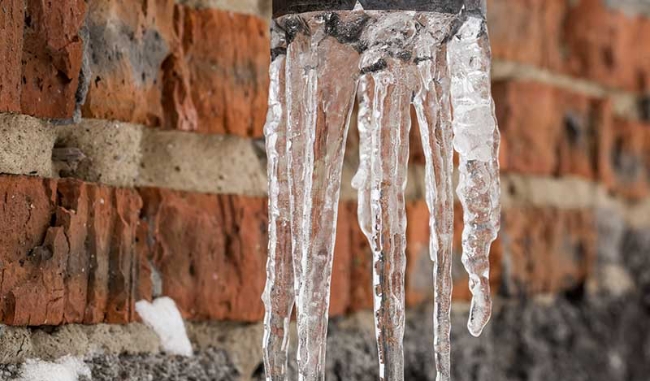Are you interested in help around Helpful Tips to Prevent Frozen Pipes this Winter?

Cold weather can ruin your pipes, particularly by freezing pipes. Right here's exactly how to stop it from happening and what to do if it does.
Introduction
As temperatures drop, the risk of frozen pipes increases, potentially causing expensive repair services and water damages. Comprehending exactly how to avoid frozen pipelines is critical for homeowners in cool environments.
Prevention Tips
Insulating at risk pipelines
Wrap pipelines in insulation sleeves or utilize warmth tape to secure them from freezing temperature levels. Concentrate on pipes in unheated or external locations of the home.
Home heating techniques
Keep interior areas properly heated up, specifically locations with pipes. Open up closet doors to enable cozy air to distribute around pipelines under sinks.
Just how to recognize frozen pipelines
Search for lowered water circulation from faucets, unusual odors or noises from pipelines, and noticeable frost on revealed pipelines.
Long-Term Solutions
Structural adjustments
Think about rerouting pipelines away from exterior walls or unheated locations. Include additional insulation to attic rooms, basements, and crawl spaces.
Upgrading insulation
Invest in top notch insulation for pipelines, attics, and walls. Correct insulation aids preserve constant temperatures and reduces the threat of frozen pipes.
Shielding Exterior Plumbing
Yard pipes and outdoor taps
Detach and drain pipes garden pipes before winter season. Install frost-proof faucets or cover outside faucets with shielded caps.
Comprehending Icy Pipelines
What creates pipes to ice up?
Pipes ice up when exposed to temperatures listed below 32 ° F (0 ° C) for expanded durations. As water inside the pipes ices up, it expands, taxing the pipe walls and possibly causing them to rupture.
Dangers and problems
Frozen pipelines can lead to water disruptions, residential or commercial property damage, and costly repair services. Burst pipes can flood homes and cause extensive architectural damages.
Indications of Frozen Pipeline
Identifying icy pipes early can prevent them from breaking.
What to Do If Your Pipelines Freeze
Immediate actions to take
If you believe icy pipes, maintain faucets open up to soothe pressure as the ice thaws. Utilize a hairdryer or towels taken in hot water to thaw pipelines slowly.
Verdict
Avoiding icy pipelines needs aggressive steps and fast feedbacks. By comprehending the reasons, indicators, and safety nets, house owners can protect their pipes throughout cold weather.
Helpful Tips to Prevent Frozen Pipes this Winter
UNDERSTANDING THE BASICS: WHY PIPES FREEZE AND WHY IT’S A PROBLEM
Water freezing inside pipes is common during the winter months, but understanding why pipes freeze, and the potential problems it can cause is crucial in preventing such incidents. This section will delve into the basics of why pipes freeze and the associated problems that may arise.
THE SCIENCE BEHIND FROZEN PIPES
When water reaches freezing temperatures, it undergoes a physical transformation and solidifies into ice. This expansion of water as it freezes is the primary reason pipes can burst. As the water inside the pipe freezes, it expands, creating immense pressure on the walls. If the pressure becomes too great, the pipe can crack or rupture, leading to leaks and water damage.
FACTORS THAT CONTRIBUTE TO PIPE FREEZING
- Low Temperatures: Extremely cold weather, especially below freezing, increases the risk of pipes freezing.
- Uninsulated or Poorly Insulated Pipes: Pipes located in unheated areas, such as basements, crawl spaces, or attics, are more prone to freezing. Insufficient insulation or lack of insulation altogether exacerbates the problem.
- Exterior Wall Exposure: Pipes running along exterior walls are susceptible to freezing as they encounter colder temperatures outside.
- Lack of Heating or Temperature Regulation: Inadequate heating or inconsistent temperature control in your home can contribute to frozen pipes.
PROBLEMS CAUSED BY FROZEN PIPES
WHY CERTAIN PIPES ARE MORE PRONE TO FREEZING
- Pipe Bursting: As mentioned earlier, the expansion of water as it freezes can cause pipes to burst, resulting in significant water damage.
- Water Damage: When pipes burst, it can lead to flooding and water damage to your property, including walls, ceilings, flooring, and personal belongings.
- Structural Damage: Prolonged exposure to water from burst pipes can compromise the structural integrity of your home, leading to costly repairs.
- Mold and Mildew Growth: Excess moisture from water damage can create a favorable environment for mold and mildew growth, posing health risks to occupants.
- Disrupted Water Supply: Frozen pipes can also result in a complete or partial loss of water supply until the issue is resolved.
https://busybusy.com/blog/helpful-tips-to-prevent-frozen-pipes-this-winter/
- Location: Pipes located in unheated or poorly insulated areas, such as basements, crawl spaces, attics, or exterior walls, are at higher risk of freezing.
- Exterior Pipes: Outdoor pipes, such as those used for irrigation or exposed plumbing, are particularly vulnerable to freezing as they are directly exposed to the elements.
- Supply Lines: Pipes that carry water from the main water supply into your home, including the main water line, are critical to protect as freezing in these lines can affect your entire plumbing system.
- Underground Pipes: Pipes buried underground, such as those connected to sprinkler systems or outdoor faucets, can be susceptible to freezing if not properly insulated.

I stumbled upon that post about Winter Plumbing Precautions: Preventing Frozen Pipes while doing a lookup on the search engines. Are you aware of somebody else who is inquisitive about the subject? Please feel free to share it. We thank you for reading our article about How to prepare your home plumbing for winter weather.
Pricing
Comments on “Ways to Safeguard Plumbing System from Cold Weather: Essential Tips”